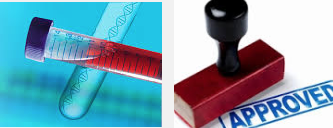This is it: First blood test to detect EGFR gene mutations in NSCLC

Last Updated on June 3, 2016 by Joseph Gut – thasso
June 03, 2016 – This is a huge step in the application of theragenomic medicine in cancer patients in the quest to deliver highly individualized health care for patients. Thus, on June 01, the American Food & Drug Administration (FDA) approved the cobas EGFR Mutation Test v2, a blood-based companion test for the  cancer drug Erlotinib (Tarceva). This is the first FDA-approved, blood-based genetic test that can detect epidermal growth factor receptor (EGFR) gene mutations in non-small cell lung cancer (NSCLC) patients. Such mutations are present in approximately 10-20 percent of NSCLC.
cancer drug Erlotinib (Tarceva). This is the first FDA-approved, blood-based genetic test that can detect epidermal growth factor receptor (EGFR) gene mutations in non-small cell lung cancer (NSCLC) patients. Such mutations are present in approximately 10-20 percent of NSCLC.
Lung cancer is the leading cause of cancer-related death among men and women in the U.S. and, though more common in men, the number of deaths from lung cancer in women is increasing. According to the National Cancer Institute, an estimated 221,200 Americans will be diagnosed with lung cancer, and 158,040 will die from the disease this year. NSCLC is the most common type of lung cancer.
NSCLC tumors may shed tumor DNA into a patient’s blood, making it possible to detect specific mutations in blood samples. Testing for tumor DNA using a blood sample instead of a tissue or tumor sample is called a “liquid biopsy.” Liquid biopsies have the potential to allow physicians to identify patients whose tumors have specific mutations in the least invasive way possible. With the cobas EGFR Mutation Test v2, the presence of specific NSCLC mutations [exon 19 deletion or exon 21 (L858R) substitution mutations] detected in patients’ blood samples aids in selecting those who may benefit from treatment with Erlotinib (Tarceva). When the test provides positive results, it may benefit patients who may be too ill or are otherwise unable to provide a tumor specimen for EGFR testing. The efficacy of the cobas EGFR Mutation Test v2 using blood samples was determined by using the test to identify the EGFR mutation status in patients enrolled into a clinical trial whose tumor biopsies were previously confirmed positive for the EGFR exon 19 deletion or L858R mutations as determined by the cobas EGFR Mutation Test v1.
If such mutations are not detected in the blood of a patient, and NSCLC is present, then a tumor biopsy should still be performed to determine if the NSCLC mutations are present and make the tumor amenable to selected targeted therapy with Tarceva.
The FDA approved Erlotinib (Tarceva) in 2004 to treat patients with locally advanced or metastatic NSCLC after failure of at least one prior chemotherapy regimen, and in 2013, the FDA approved it for the first-line treatment of patients with metastatic non-small cell lung cancer whose tumors having EGFR exon 19 deletions or L858R substitution mutations as detected by an FDA-approved test. The most common side effects of Erlotinib (Tarceva) are rash, diarrhea, anorexia, fatigue, difficulty breathing (dyspnea), cough, nausea and vomiting. Erlotinib (Tarceva) is not recommended for use in combination with platinum-based chemotherapy and the drug has not been evaluated as first-line treatment in patients with metastatic NSCLC whose tumors have EGFR mutations other than exon 19 deletions or L858R substitution mutations.

